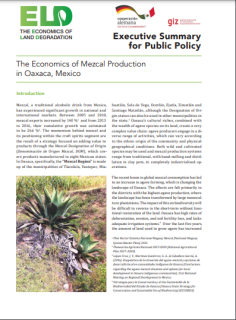
Mezcal, the traditional drink from Mexico, has experienced increasing demand on the global market. The boom has also led to an increase in agave farming, changing the landscape of Oaxaca. The region has high rates of deforestation, erosion, and soil fertility loss and lacks adequate irrigation systems.
The impact of this on biodiversity will be difficult to reverse in the short term without functional restoration of the land. Using a methodology developed by the Economics of Land Degradation (ELD) Initiative, an economic valuation of the ecosystem services related to agave production for mezcal was conducted, evaluating the economic potential of applying a sustainability strategy to agave-mezcal production.
The objective of the policy brief is to enable decision-makers to create the conditions for translating this economic potential into real wealth, so as to benefit the producers and actors in the value chain, achieve food security and mitigate the effects of climate change.
